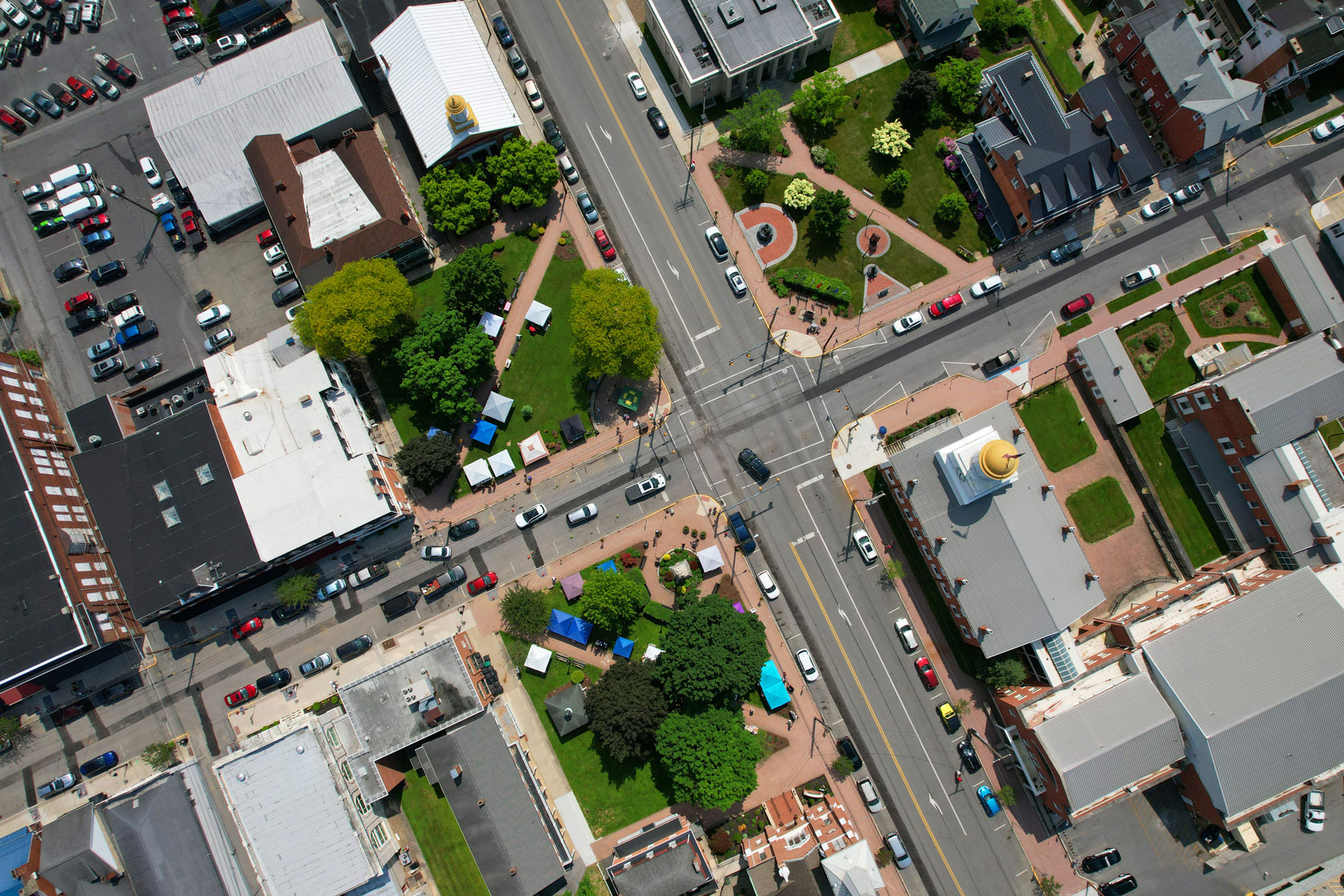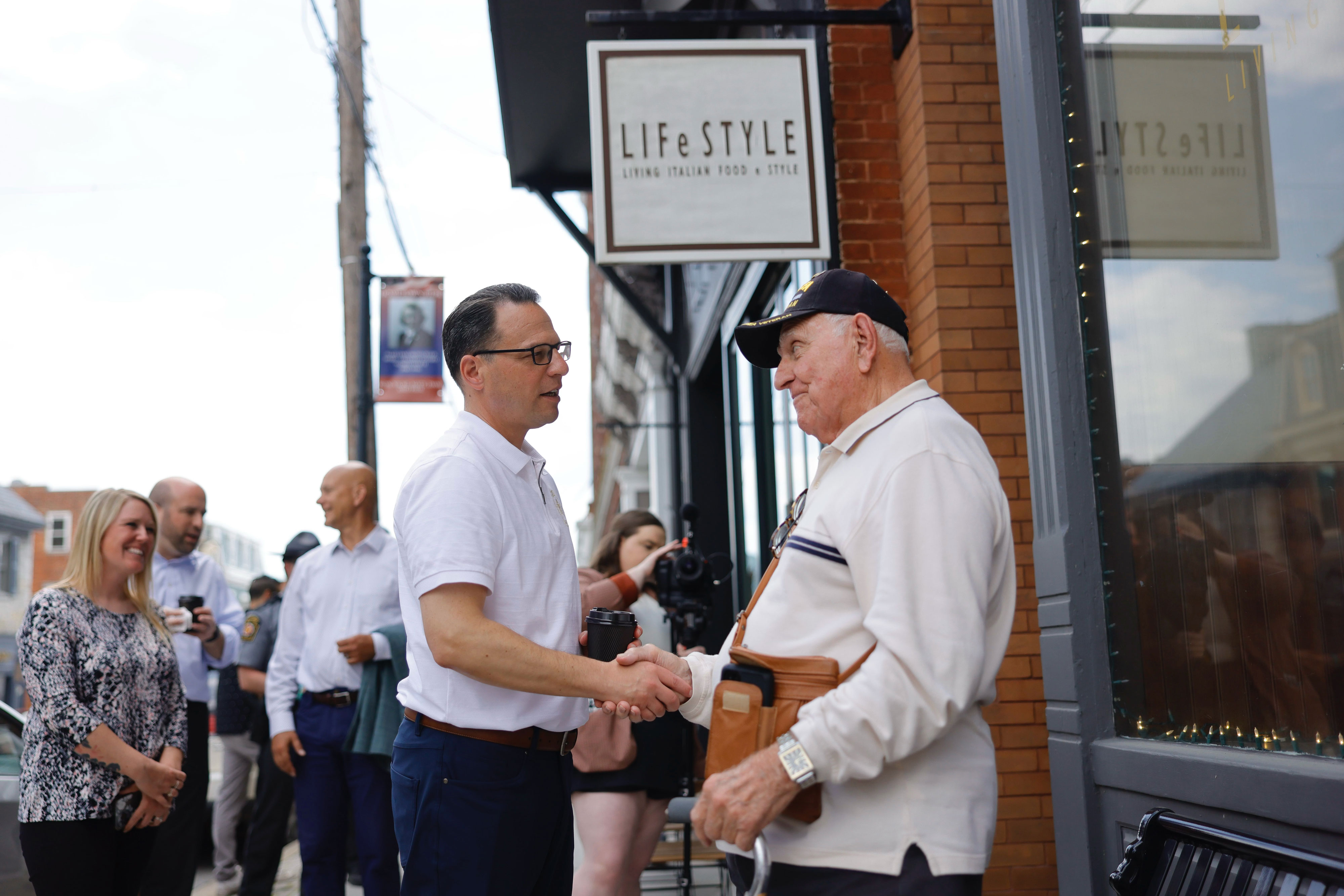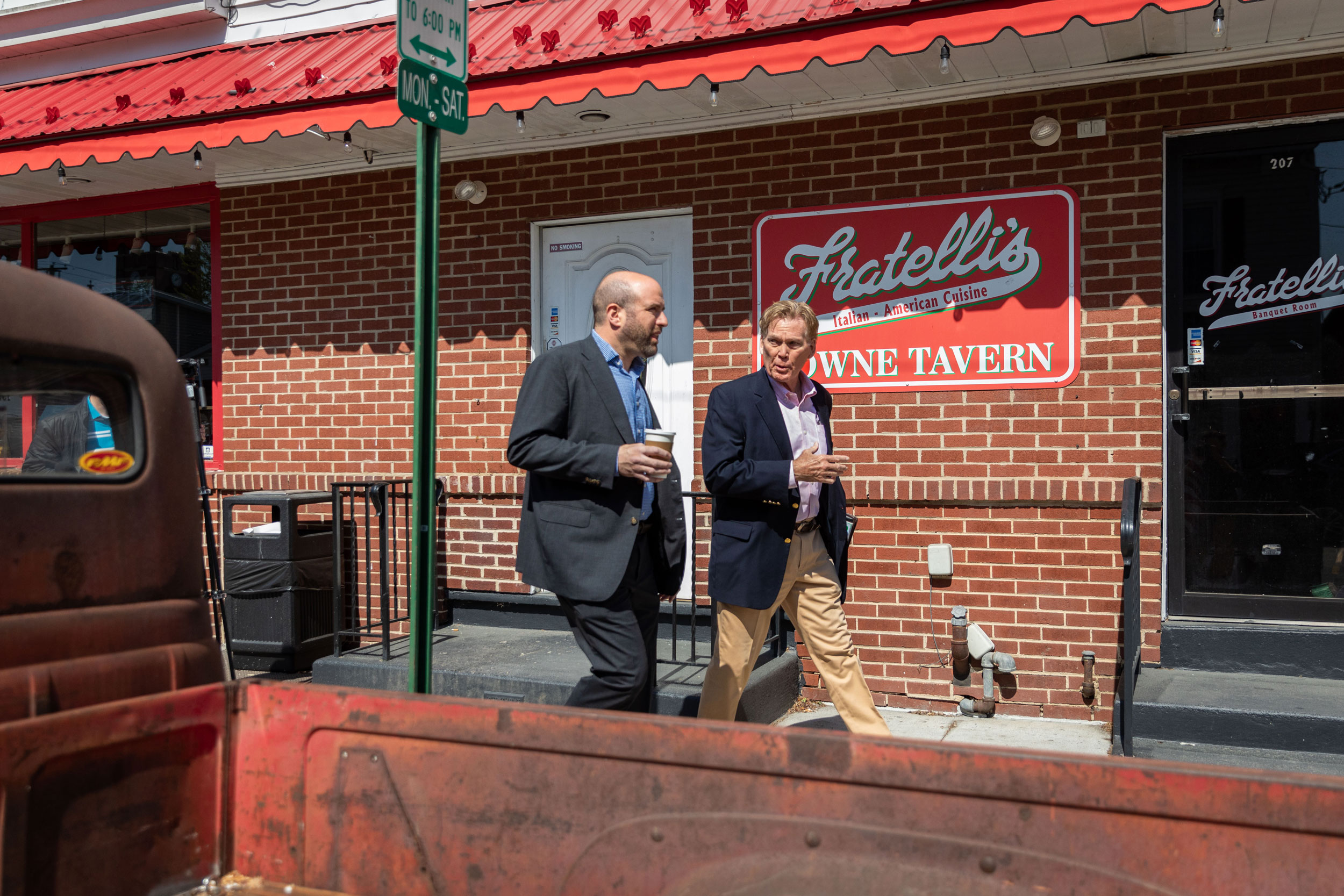Economic Development
The push to revitalize PA’s Main Streets hits a speed bump
After years of progress in bringing “third places” to the forefront, funding shortfalls threaten future economic success

Gov. Josh Shapiro examines a map during a visit to Hummelstown. Commonwealth Media Services
In 2019, Casey and Wes Phebus turned what was once a news agency into the newest attraction in the south-central Pennsylvania borough of Waynesboro, transforming the space and repurposing old bowling lanes into taproom furniture in the process.
The Phebus family held a soft launch for their venture, Rough Edges Brewing, located at the end of Waynesboro’s Main Street in early 2020 – just weeks before the COVID-19 pandemic forced businesses across the state to close their doors indefinitely.
In March 2020 – during what would have been Rough Edges’ long-planned grand opening – COVID-19 and the state-mandated business closures that followed brought everything to a halt. The Phebuses quickly shifted their business strategy, focusing on to-go orders and getting the community support needed to keep them afloat during those fraught days of the pandemic.
“The community was so supportive of us,” Casey Phebus told City & State. “I think a lot of people felt bad for us, being brand-new, and they really wanted to make sure that we hung around.”
A vibrant Main Street can be the lifeblood of a community, particularly in rural parts of the commonwealth, where residents often seek that third place outside the home and workplace where people can converge and converse without a social or financial barrier.
From breweries and boutiques to bike shops and brunch spots, the commonwealth’s downtowns are striving to provide those third places – and the economic growth essential for the success of the surrounding community.
“What we’re looking to create are communities where individuals can choose – a place where people have the opportunity to choose to live there, to start a family, to retire, to start a business,” Julie Fitzpatrick, executive director of the nonprofit organization Pennsylvania Downtown Center, told City & State. “We’re not just trying to create artificial communities (such as) at Disney World, where tourists come and they spend their dollars and then they go home … We really want to create rich, authentic, economically viable places.”
The Pennsylvania Downtown Center, an affiliate of the National Main Street Center, is the only statewide nonprofit solely dedicated to revitalizing the state’s core communities. The Downtown Center assists in coordinating Main Street programs and has been a partner with the state Department of Community and Economic Development for 24 years.
“Main Street is a model for community revitalization,” Fitzpatrick said. “Not every state has a program that funds Main Streets … but there’s always an opportunity to grow it.”
The funder years
Lynne Sobel Ragusea, Main Street coordinator with the Lewisburg Downtown Partnership, said many Pennsylvania downtowns, lined with aging and historic buildings, are in the midst of a transformation being driven by efforts to boost the local economy.
“I really strongly feel a connection to small towns and keeping them alive, and in Central Pennsylvania, that isn’t the easiest task all the time,” Sobel Ragusea told City & State. “Some of the industries that our towns have been built up on and around have gone by the way of history, and we need to find ways to reenergize our downtowns as places where people go.”
Sobel Ragusea said that revitalizing a downtown offers the best opportunity for a community to grow and create a cycle of continued investment.

“Malls are generally dying out. We had a stretch where you went out to the mall and everything was out on the highway; I think we’re coming back to a renaissance of downtowns and recognizing the importance of having a third place in your community,” she said. “I think places like universities and hospitals recognize that in order for them to recruit students, talented doctors and professors, they need to have a community that people want to live in, and so they invest back in the town, knowing that it will help bring in the talent that they need for their businesses to thrive.”
Statewide support for Main Street programs, which focus on commercial corridors, and for Elm Street programs, which focus on neighborhoods, was $56 million in 2009 – about $5 per capita in the commonwealth, according to the Downtown Center. That funding number has dropped significantly over the past decade-plus, with just more than $6 million – or $0.54 per capita – available to such programs in more recent years.
In the ongoing aftermath of the pandemic-driven downturn for small businesses and, in turn, downtown districts over the last few years, those in the local economic development space have called for greater support at the statewide and federal levels.
Jarred Heuer, executive director of the Clarion County Economic Development Corp., is one of the many individuals on the ground working alongside businesses to leverage public and private dollars to the best of their ability.
“We want to go through this visioning process to really determine what these communities see as the need for themselves and then how can we, as a facilitator, find feasible, sustainable methods that can be funded,” Heuer told City & State. “These are the things that especially rural communities need. There’s not just a lack of money in terms of funding projects; there’s a lack of capacity for these small communities able to just keep the momentum and grow.”
From State Street to Main Street
Harrisburg lawmakers on both sides of the aisle recognize the need to support these local economic development efforts.
As part of the current funding push, Democratic Gov. Josh Shapiro announced earlier this year nearly $7 million through the Keystone Communities Program to support 49 community improvement projects in 25 counties. The Keystone Communities Program, run through the state Department of Community and Economic Development, encourages public and private partnerships at the local level and facilitates targeted investment and development such as event planning activities, façade grant programs, accessible housing programs and other grants.
Shapiro proposed a $25 million investment to create the Main Street Matters program, which would build upon the successes of the Keystone Communities program and support the downtowns and commercial corridors that are the backbone of many commonwealth communities.

“If we want to attract new businesses to Pennsylvania, support entrepreneurs and employees, and give folks the opportunity to build generational wealth, then we’ve got to make sure our communities have healthy, vibrant Main Streets lined with shops and small businesses, just like the one here in Lebo,” Shapiro said visiting Mt. Lebanon in February, days after laying out his plan for Main Street Matters in his budget address. “Along with the other investments I proposed last week, supporting our main streets is a key part of our commonwealth’s first economic development strategy in nearly two decades. This is common sense. It’s good for our commonwealth, it’s good for our communities, and it’s good for people. These investments matter – because Main Street matters.”
After an 11-day budget impasse, negotiations at the Capitol led to Main Street Matters getting approved – but for only $20 million.
Fitzpatrick explained that the $25 million ask for PA Downtowns was due to the increasing need to support operational assistance and necessary implementation of the program and support for the 40 programs held under the Main Street Matter umbrella.
DCED spokesperson Penny Ickes said in a statement that there is “always compromise in the budget process … the $20 million for the new Main Street Matters program will help deliver more state investments in the growth and stability of neighborhoods, main streets and downtown districts so that Pennsylvania’s communities and their residents can thrive.” Ickes added that the budget funding “was allocated with strong bipartisan support – and DCED looks forward to investing in communities across the Commonwealth, supporting small businesses and creating vibrant downtowns and commercial corridors to attract visitors, business, and industry.”
Economic engines
According to the Downtown Center, the Main Street and Elm Street programs yielded a positive impact across the commonwealth in 2023. During the last calendar year, the programs delivered 739 net full-time jobs and 786 net part-time jobs, as well as 73 net new businesses. Fitzpatrick said that while those numbers are conservative estimates, it can be projected that the programs provided more than $90 million in public and private investment in 2023. Those dollars, whether they’re coming from the state or from a local source, have a direct impact on the community and economy through the reinvestment in small downtown businesses.
“Main Streets across the commonwealth are kind of getting their due as being really great business incubators on their own,” Sean Ziller, deputy director of economic development with the City of Bethlehem, told City & State.
Success stories can be seen in cities like Bethlehem and boroughs like Waynesboro, but the common denominator across the commonwealth is the ability for local businesses and organizations to leverage public and private dollars in a way that best suits their downtown needs.

Bill Kohler, director of Mainstreet Waynesboro Inc., was an integral part of the Phebus family’s push to open up a brewery, and his work putting together community events and promoting downtown businesses has put Waynesboro on a path to further economic growth.
“I want my tax money (going to) the things that make our communities better,” Kohler told City & State. “Downtown can be the living room or the kitchen. It also could be the space in the backyard (where) people go and that’s where they want to hang out. That’s what we really succeeded at here.”
Rough Edges has now built a kitchen and is expanding into the second floor of the building to offer an event space and additional seating.
“Over the last 20 years … there wasn’t really anybody hanging out downtown. It was not a place that you wanted to be,” Casey Phebus said, noting the turnaround Waynesboro has experienced with the help of Kohler and Mainstreet Waynesboro Inc. “Anybody that doesn’t have a (downtown organization) should definitely get an organization (whose) main focus is just keeping their downtown vibrant.”
